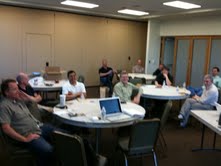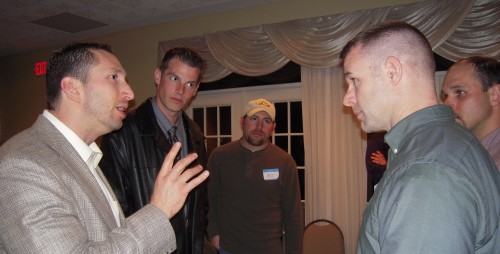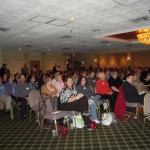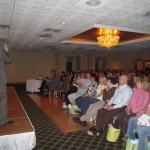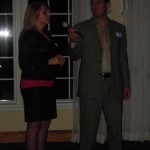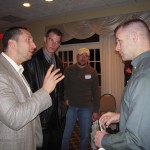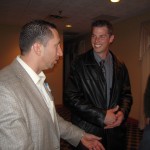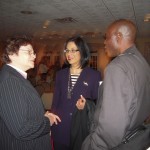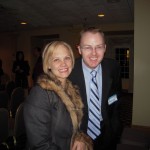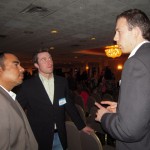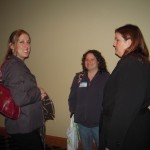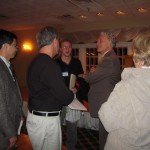Right now I’m sitting in an Upper West Side Manhattan apartment, in this little nook by a double window typing away on my Macbook Air. Every few minutes my eyes break free of the screen towards scattered glances in the alley of brick lined apartments and rusty old fire escapes cascading the sides of pre-war buildings, while Kaskade is playing through Pandora, a black coffee in my hands and the goal to be running in Central Park in 60-minutes after I finish posting about something I’ve thought about for quite a while.
This week in NYC I was prompted to write after spending some time with a few former people with whom I’ve worked (epic, insanely talented and amazing people who I loved working with and were catalysts to building great teams). It was a hard hitting reminder to me about something I’ve wanted to write about for years, which is my relatively simple premise around the effect chemistry can have on building great teams.
It’s a pretty simple distillation of my hiring philosophy, after a lot of experience in both big and small companies–including a few raw start-ups and two re-starts– in a lot of different geographies, a fair amount of study on the subject, and more than a few mistakes along the way, I’ve essentially boiled my hiring and team-building decision-making into two very simple evaluations: Competency and Chemistry
A lot can be learned from insightful readings from a few of the best of the best related to leadership development, executive hiring, and creating high performing teams. Welch is legendary, especially with more established entities; Bezos is all around brilliant and pulls in a big-growth-company-meets-scrappy-upstart philosophy for the digital world that’s insanely customer-driven; Collins is a super solid researcher that’s studied the best of the best and carries killer insights based on aggregated data and interviews. And there’s a bunch of bits and pieces I’ve picked up from start-ups, including personal experiences, other Exec’s, and investors.
But even after all of this, I’ve pretty much broken it down into these two key characteristics. The reality is also that people can only process so much information and evaluate decisions on so many criteria. It’s why running a company trying to monitor and asses 12+ metrics is simply ineffective and dilutive; instead it’s better to zone in on 3-5 key metrics. Nail those. And, if you can bring it down to one or two then all the better (and do the same for each division or department). The same premise applies for hiring.
The competency part of hiring and building great teams is pretty self explanatory, so I’m not even going to carry a description here, other than to say for me this is a bit of broad definition that includes character, tenacity, skills, efficiency, intelligence. It’s effectively summarized in a question like “Is this person in the top 10-20 percentile in what they do and how they do it?” That’s competency.
The chemistry part, well that’s where the mojo is. Harder to define and more crystallized by asking the question of “Does he/she add magic to the team?” It’s something you can just feel. Team sports are an easier illustration; I can remember years playing football in college with guys who were good, but not great. However, had insane team chemistry. Those years yielded better results than when it was reversed. I can think back on business experiences and see this as well–and when we’ve had the intersection between insanely competent teams with great chemistry, the results AND the experience was unreal. I once had a football coach repeatedly tell us “Men, you don’t have to like each other…but you do need to love each other.” I think there’s a lot of insight there; and too many business environments exist where people neither like nor love their teams–despite being competent. And then they wonder why they don’t perform as well as they can, why there’s churn, why coming to work isn’t fun, engaging, or rewarding. There’s no mystery around it.
Chemistry isn’t this soft skill or some diluted esoteric parameter. Chemistry is intertwined with the answer to questions like: Do I respect her? Will he make the team work harder through influence? Do I trust there isn’t game playing and ulterior motive? Does he care about people and have an unrelenting passion for winning, including especially the team–or is he in the win for himself? Even at the cost of others? Is the very act of work fun, engaging, and rewarding with her?
A lot of companies try to do all these team-building things to engage or create chemistry. You know what? If you think in order to create chemistry you need to go do offsite team building, drink beer after work, do a trust fall, or–God forbid–hire a consultant to address this, you’re flat out screwed. You don’t have it, and you probably won’t get it.
My favorite business memories weren’t forced outings, retreats, and canned prescriptive stuff (yeah, I’ve also tried it before myself). Instead, my best memories were doing epic things in business and enjoying an insanely great team. In other words, it was actually often the most challenging and difficult work itself, and doing that with great people, that I liked the best. That comes from working with people who have great chemistry together.
In any business, accelerators are a part of the competitive advantage. Getting to market faster, higher close ratios, faster cycles, better deliverables, quicker communication with better transference of information and less noise. Conversely, the “chemistry” dynamic doesn’t mean everyone is homogeneous and shares similar views. That’s actually the magic of chemistry. It magnifies distinctions. It brings them out, faster, and because there’s trust you can cycle faster, learn more, and cover more ground. That’s directly attributable to chemistry.
The very thing that makes up the manifestation of hard metrics and actual results comes down to how good the teams are, and how well they work together, and how much they trust each other. It drives the function of how frequently people communicate, the ability to use short-hand and move faster, the number of hours the teams wants to spend working, along with the intensity or projects and execution of programs. It’s that simple.
Part of great chemistry is not wanting to let other people down–not because you’re afraid of pissing them off or some retribution, but because you’re a team and you want to win. You want to see them win. And you’ll go to the end of the earth to contribute your part, because that’s what happens when people depend on each other, trust each other, and have great chemistry. They come through. They deliver results. Not out of some form of obligation or even just the paycheck, but out of desire. There’s a huge difference. Working from the basis of the former creates liabilities. Working from the basis of the latter builds assets.
It’s clear great teams have an exponentiating effect on performance; and a big part of that is chemistry within the team. Chemistry is the juice that makes competency come to life, otherwise all these insanely epic skills that people carry are too often hidden from fully developing when the chemistry is missing.
My experience is that those individuals and teams with just the great competency are difficult to find. Finding individuals and teams with great competency that add a massive multiplier with the chemistry dynamic? That’s really rare.
And it’s also where the magic is.
No doubts, take Lasix only as prescribed by your doc. Levitra is one of the best-known medications of all period. What is the most significant info you must study about levitra vs cialis? Most doctors say the effectiveness of Levitra is well documented. Absolutely, a sexual problem refers to a problem during any phase of the sexual response cycle that prevents the individual from experiencing satisfaction from the sexual life. Whilst sex is not vital for good soundness, it�s doubtless important for anyone. Why it happen? What kinds of professionals treat sexual diseases in men? A common class of antidepressants, which include Zoloft � can kill the mood in bedroom.




